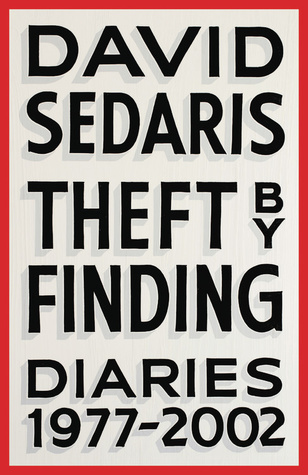“In the U.K., if you discover something of value and keep it, that's theft by finding,” she told me. “You're supposed to investigate whether it was lost or stolen, though in this case – five pounds – of course you're fine.”
Theft by finding. It was, I thought, the perfect title for this book.I've read quite a bit of David Sedaris and his collections of wry and biting essays, and I think it was in Let's Explore Diabetes with Owls that I first learned his work method: Walking around every day with a notebook in his pocket, Sedaris listens in on conversations, interacts with strangers, and otherwise attempts to live a life worth recording; writing it all down in his notebook. At the end of every day, he rewrites these snippets into his diary, and eventually, combs these entries for those stories that would make for wry and biting essays. Theft by Finding: Diaries (1977-2002) is the first of two compilations of forty years of such diary entries, and as Sedaris warns in the foreword, he edited the diaries himself – leaving out the pages and pages of early meth-fueled rants, but otherwise attempting to provide a fair picture. I guess we'll need to take him at his word. Although Sedaris demurs that he can't imagine anyone reading this book straight through, I did and I found it to be very interesting – a quite satisfying, if somewhat sketchy, method of memoir.
In order to record your life, you sort of need to live it. Not at your desk, but beyond it. Out in the world where it's so beautiful and complex and painful that sometimes you just need to sit down and write about it.Probably what I liked best were those entries that marked something I was familiar with from Sedaris' earlier writing – the day he first met the acidic downstairs neighbour, Helen, in New York; casually noting when he first met his partner Hugh; when he first attended the French lessons in Paris that became the title piece in Me Talk Pretty One Day – but nearly as satisfying would be all that I didn't know: the early days of poverty and drug- and alcohol-fueled debauchery; that he began his career as a visual artist; that he and his sister Amy made a splash Off-Broadway for years. Sedaris also notes in his foreword that he has never been interested in recording self-reflection – this is a very outward-facing narrative – yet he still tells a tale of hard work (days spent as a handyman or furniture mover followed by evenings reading at the IHOP) and the evolution of his art to the written word. And because he's writing to himself, Sedaris never feels the need to explain anything – in one of his books I had read why he and Hugh moved to France, but here they are just suddenly there; you need to infer when he's on a book tour or just back home visiting family; and it all works.
The tone of the book, naturally, evolves over time: Sedaris himself grew from a hitch-hiking dropout to a world-famous, polished writer, and by the end, the entries feel like they're meant to be read by others. Compare an early entry from October, 1977:
After a hotel for $8.50 a night, Ronnie and I found an apartment that's $30 a week for the both of us. I worry about money, but when it's gone, it's gone. I smoked my first cigarette. It's embarrassing, but you do get a buzz off it. I did, anyway, on Davie Street.And one from December, 2000:
Apparently I don't have AIDS. The French bank received my blood test and approved my mortgage, so, though I haven't yet read it on a piece of paper, I'm guessing I'm negative. This is sort of major, as, for the past fifteen years, I've just naturally assumed I was infected. Every time I sweat at night, every time I get a sore or run a fever, I think that it's finally kicked in. It wasn't always at the front of my mind, but it was always there. It sounds goofy, but it's going to take a while for the news to sink in. I'm not disappointed; I just need to figure out what to do between now and the time I develop cancer.I will allow that I might have found this more interesting because of my prior dips into Sedaris' writing, but I'm happy to have read the first volume and am looking forward to the second; I wonder if there will be so many people named Pee Wee and references to wheelchairs in it?

